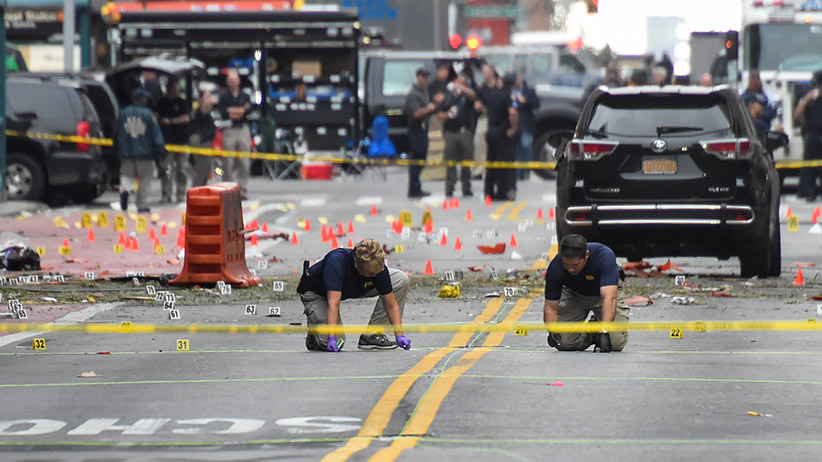Donald Trump in the time of terror
Recent attacks may play well for Donald Trump—and he’s exactly who ISIS wants to see in the White House
Federal Bureau of Investigation (FBI) officials mark the ground near the site of an explosion in the Chelsea neighborhood of Manhattan, New York, U.S. September 18, 2016. (Rashid Umar Abbasi/Reuters)
Share

Donald Trump has a plan to defeat Islamic State that’s so simple it could fit on the back of a cocktail napkin. Or be slurred by the drunk on the next bar stool. “We’re going to have to do something extremely tough over there,” the Republican nominee told Fox News this week. “Like knock the hell out of them.”
His remarks came in the wake of explosions in New York and New Jersey, and a stabbing rampage at a Minnesota mall carried out by American devotees of the jihadist group, but they’re variations on an established theme. For more than a year now, the bellicose billionaire has been vowing to bomb both the “hell” and the “s–t” out of Islamic State, and promising that he knows a “foolproof” way to defeat them “quickly” if elected.
The specifics, as with so many of his policy positions, are hard to come by. Initially, Trump said he didn’t want his Republican primary opponents to steal his ideas, then he worried aloud about forewarning the terrorists. Although recently, he told an audience in North Carolina that he’s going to give U.S. military leaders 30 days to come up with a better strategy—even though he’s certain he knows more than the generals. His preferred solution might well involve nukes. Trump has repeatedly refused to rule out using weapons of mass destruction against America’s enemies in the Middle East—or even its friends in Europe. “I’m not going to take it off the table for anybody,” he told both MSNBC and Fox last spring. “Europe is a big place.” Plan your 2017 vacation accordingly.
There’s no question that America and many of its allies, including Canada, are under threat from both foreign terrorists and homegrown “lone wolf” attackers. The proof has been delivered in bodies and blood in the streets of Paris, Brussels, Baghdad, Nice, Istanbul and Orlando. Twenty-nine people were wounded in the New York blast, and 10 more hurt in Minnesota; all will recover, thankfully. Many more plotters have failed or been thwarted—like Aaron Driver who was killed by police in Strathroy, Ont., in August, as he left his home with a pair of explosive devices. In the United States alone, 105 people have been charged with ISIS-related offences since March 2014. As Islamic State sees its self-declared caliphate in Syria and Iraq crumble, the frequency, desperation and deadly ambition of the attacks and attempts only increases.
Trump has accused President Barack Obama and Democratic nominee Hillary Clinton of being the “founders” of ISIS, suggesting their decision to withdraw American troops from Iraq in 2011 fuelled the group’s rise. He’s wrong: the Islamic State’s ideology was forged in the resistance to George W. Bush’s U.S. occupation, with its leadership and network built inside military jails. Its rapid expansion in 2013 had as much to do with the sectarian brutality of the regimes of Syria’s Bashar al-Assad and Iraq’s Nouri al-Maliki as America’s many past, bipartisan blunders.
But what should really concern U.S. voters is the present, and who Islamic State wishes to see in the White House come January. This week, Trump has been busy telling his audiences that it’s the “weak and ineffective” Clinton. “They want her so badly to be president, you have no idea,” he said at a Florida rally. “It will be a field day.” The evidence, however, suggests just the opposite. Jihadi websites and social media accounts are openly pulling for Trump, and clips from his speeches — like his repeated vow to ban Muslims from entering the United States — have been prominently featured in propaganda videos. The prevailing wisdom among political pundits is that terror attacks on U.S. soil strengthen Trump’s candidacy. And ISIS concurs.
Supporters of the terrorist organization believe President Trump would be good for business — alienating mainstream Muslims and driving further radicalization at home and abroad. They also anticipate that the Republican would fight differently than the Democrats, putting a substantial number of American troops on the ground in Syria and Iraq. Offering hope that a favourite ISIS prophecy of a “final battle” where the caliphate triumphs over the “forces of Rome” might be fulfilled, kickstarting the Apocalypse.
The U.S.-led, global struggle against jihadist terrorism has dragged on for more than 15 years now. Political instability throughout the Middle East, as well as raging civil wars in Syria, Iraq, Yemen and Afghanistan, suggest it’s unlikely to conclude anytime soon. While there are apparently votes to be had in promising bans on refugees and immigrants, racial profiling and loyalty tests, that doesn’t mean that they are wise or helpful proposals. “There is always an easy solution to every human problem — neat, plausible, and wrong,” the great American critic H.L. Mencken wrote 100 years ago. Just the kind of thing that fits on the back of a napkin.